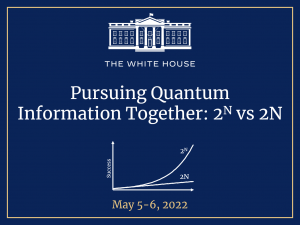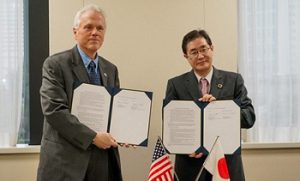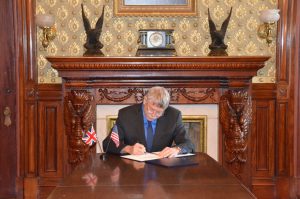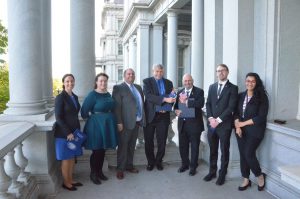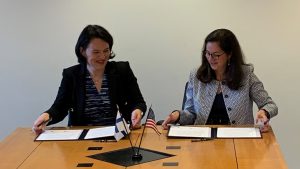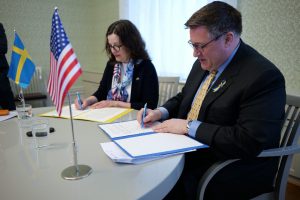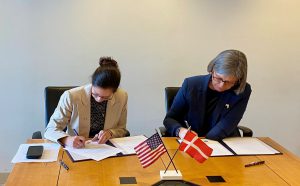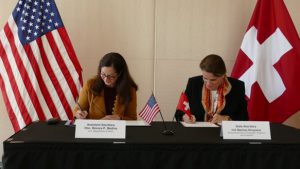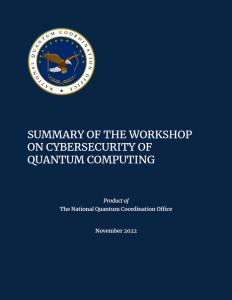The second component of the national quantum strategy is enhancing competitiveness by accelerating technology development toward useful economic and mission applications of QIS and working with international partners, while also protecting national security.
INDUSTRY CONSORTIUM

The Quantum Economic Development Consortium (QED-C) is an industry-led consortium of stakeholders that aims to enable and grow the U.S. quantum industry. QED-C was established with support from the National Institute of Standards and Technology (NIST) as part of the Federal strategy for advancing quantum information science and as called for by the National Quantum Initiative Act enacted in 2018. The mission of QED-C is to enable and grow a robust commercial quantum-based industry and associated supply chain in the United States.
Today, QED-C has support from multiple agencies and a diverse set of industry, academic, and other stakeholders. QED-C participants are working together to identify gaps in technology, standards, and workforce and to address those gaps through collaboration.
INDUSTRY EVENTS
White House Summit on Quantum Industry and Society
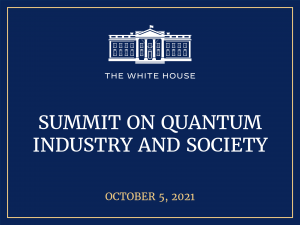
On October 5, 2021, the White House Office of Science and Technology Policy (OSTP) National Quantum Coordination Office (NQCO) convened industry stakeholders from across the country to discuss how quantum computers and quantum sensors will benefit American society. Challenges and opportunities for increasing United States competitiveness in this critical industry of the future were also discussed.
The summit included a roundtable discussion with Executive Office of the President representatives and leaders from quantum information technology companies. The roundtable focused on understanding the applications of quantum information science, the barriers for transitioning quantum R&D concepts into products or services in a global market, and the potential societal impact of quantum technologies.
More information about the summit can be found in a press release.
INTERNATIONAL DIALOGUE
Pursuing Quantum Information Together: 2N vs 2N
In May 2022, the National Quantum Coordination Office and U.S. Department of State hosted an international roundtable, Pursuing Quantum Information Together: 2N vs 2N, to foster international cooperation in quantum information science and technology (QIST). The roundtable gathered the heads of quantum strategy offices from the United States, Australia, Canada, Denmark, Finland, France, Germany, Japan, the Netherlands, Sweden, Switzerland, and the United Kingdom to reinforce the importance of international cooperation in QIST to accelerate discovery, share resources, and jointly address global challenges. A readout of the event is available here.
As an output of the roundtable, the nations launched the Entanglement Exchange, a portal for highlighting international exchange opportunities for students, postdocs, and researchers in quantum information science.
INTERNATIONAL COOPERATION
Scientific knowledge transcends national boundaries. International collaboration accelerates discoveries and provides an avenue to deepen relationships between nations. Accordingly, it is U.S. policy to promote and support international cooperation on QIS research and skills development, especially in ways that affirm principles of scientific rigor and research integrity, freedom of inquiry, merit-based competition, openness, and transparency. International collaboration is facilitated through a number of mechanisms. Bilateral agreements between U.S. agencies and their international counterparts can enable benefits such as a coordinated review process, reciprocal or joint funding, and student and researcher exchange to the benefit of both parties. In support of such ideals, the United States has been party to several cooperation statements focused on quantum information science and technology.
-
Japan. The Tokyo Statement on Quantum Cooperation signed by the United States and Japan in December of 2019, provides a framework for like-minded countries to cooperate on the advancement of quantum information science and technology (QIST). The statement declares that international partnerships are critical to bringing together the wide range of skills, expertise, and ingenuity to accelerate the research and development in QIST. The statement highlights several core principles including good-faith cooperation based on the shared values of freedom of inquiry, merit-based competition, openness and transparency, accountability, and reciprocity. Read the whole statement here, along with the quantum.gov news release here.
-
United Kingdom. The joint statement on Cooperation in Quantum Information Sciences and Technologies signed by the United States and the United Kingdom in November of 2021, builds upon the countries’ deep relationship and aims to boost collaboration to help realize the full potential of quantum technologies. In line with the Tokyo Statement on Quantum Cooperation, the statement highlights a common set of shared values, while leveraging existing bilateral science and technology cooperation mechanisms and multilateral cooperation frameworks to pursue new frontiers. Read the whole statement here, along with the quantum.gov news release here.
-
Australia. The joint statement on Cooperation in Quantum Science and Technology signed by the United States and Australia in November 2021, recognizes the depth and strength of the economic and strategic relationship between Australia and the United States and notes the nations’ shared commitment to democratic institutions and to an open, inclusive and resilient Indo-Pacific region, underpinned by rules, norms and respect for sovereignty. Read the whole statement here, along with the quantum.gov news release here.
-
Finland. The Joint Statement of the United States and Finland on Cooperation in Quantum Information Science and Technology, signed in April 2022, builds on more than two decades of robust bilateral ties, including a Science and Technology Agreement that has been in place since 1995. It underscores both countries’ intent to enhance cooperation in quantum information science and technology. Read the whole statement here, along with a quantum.gov news release here.
-
Sweden. The Joint Statement of the United States and Sweden on Cooperation in Quantum Information Science and Technology, signed in April 2022, builds upon a strong history of bilateral friendship that dates back to 1783, when Sweden was one of the first countries to recognize U.S. independence. The countries have enjoyed a fruitful and diverse science and technology cooperation, including a Science and Technology Agreement signed in 2006 that has led to several bilateral Implementing Arrangements throughout the years. Read the whole statement here, along with a quantum.gov news release here.
-
Denmark: The Joint Statement of the United States and Denmark on Cooperation in Quantum Information Science and Technology, signed in June 2022, leverages both countries’ strengths in QIST to strengthen the supply chain, grow the industrial base, and educate future generations of quantum talent. The joint statement builds upon a long and rich history of scientific engagement between both countries, including the 2009 US-Denmark Science and Technology Agreement. Read the whole statement here, along with a quantum.gov news release here.
-
Switzerland: The Joint Statement of the United States and Switzerland on Cooperation in Quantum Information Science and Technology, signed in October 2022, is an important step toward furthering the scientific ties between the two countries. Quantum information science is a priority for both nations, and their shared values and mutual expertise are crucial in developing a shared global network. Read the whole statement here, along with a quantum.gov news release here.
-
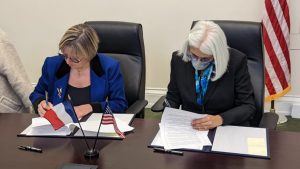
France: The Joint Statement of the United States and France on Cooperation in Quantum Information Science and Technology, signed in November 2022, took place during a broader visit between French President Emmanuel Macron and U.S. President Joe Biden in Washington—the first State Visit of the Biden-Harris Administration. It reflects the emphasis that both nations have placed on building stronger collaborations to further quantum information science together. Read the whole statement here, and a quantum.gov news release is available here.
-
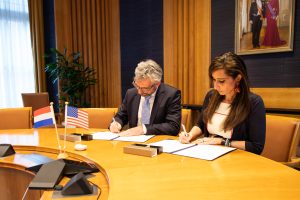
Netherlands: The Joint Statement of the United States and the Netherlands on Cooperation in Quantum Information Science and Technology, signed in February 2023, underscores robust bilateral ties between the two nations in emerging technologies, including in quantum information science, and a common dedication to individual freedom, democratic principles, human rights, and free trade. Read the whole statement here, along with a quantum.gov news release here.
-
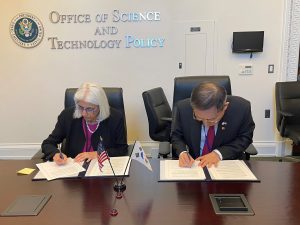
Republic of Korea: The Joint Statement of the United States and the Republic of Korea on Cooperation in Quantum Information Science and Technology, signed in April 2023, took place during a broader visit between ROK President Yoon Suk Yeol and U.S. President Joe Biden in Washington. It expresses the intent to embark on good-faith cooperation in QIST underpinned by shared values. Read the whole statement here, along with a quantum.gov news release here.
-
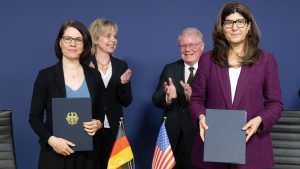
Germany: The Joint Statement on Cooperation in Quantum Information Science and Technology of the United States of America and the Federal Republic of Germany, was signed in May 2024 alongside a Joint Committee Meeting on science and technology cooperation between the two nations. The statement will facilitate follow-on activities to improve R&D collaborations, supply chains, and workforce development. Read the whole statement here, along with a quantum.gov news release here.
WORKSHOPS
Cybersecurity of Quantum Computing
The Workshop on Cybersecurity of Quantum Computing, which took place on September 29 and 30, 2022, brought together roughly 40 experts from the cybersecurity and quantum computing communities to explore how quantum computing intellectual property (IP) can be protected, mechanisms to ensure that quantum computers are not used for illicit purposes, and opportunities for research on the cybersecurity of quantum computers.
Participants noted that in cybersecurity, the best practice is to design systems with security in mind, rather than waiting until systems are developed to incorporate security considerations. They expressed the view that research programs that address the cybersecurity of quantum computing should be launched while quantum computers are still nascent. Breakout teams composed of both security and quantum computing experts identified research opportunities. Participants lauded the opportunity to engage early in discussions about quantum computer security, and they agreed that there are interesting and important research problems in this new field.
A summary of the workshop is available here.


